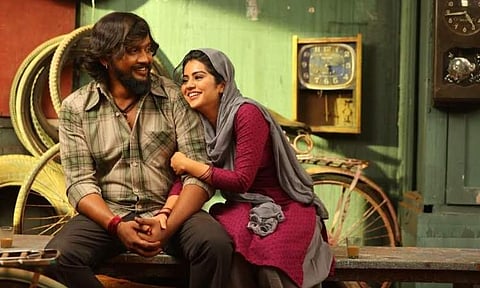

Director Jayathirtha has carved a reputation for himself by delving consistently into realistic narratives steeped in love. He sets his stories in picturesque settings and accompanies them with soulful melodies. His cinematic endeavours consistently transcend the confines of conventional storytelling. In his latest offering, Kaiva, Jayathirtha tells a romantic tale packed with action, thus diverging from his usual terrain, yet exploring a realistic subject inspired by a true event. He dives into mass genre storytelling while still retaining his touch of romanticism.
Director: Jayathirtha
Cast: Dhanveerah, Megha Shetty, Mahantesh Hiremath, Giriraj, Dinakar Thoogudeepa, Raghu Shivamooga, Ugramm Manju, Nandagopal and Ramesh Indra
Kaiva isn't just a film; it's a vivid time capsule that encapsulates the essence of Bengaluru in the '80s. It intertwines a love story with the city's dark underbelly and the poignant Karaga celebration. This narrative evokes emotions, triggers memories, and delves into a real-life incident, marking a distinct chapter.
The story, narrated through Konnaya (Jadhav), a former PC opens a portal to a bygone era, showcasing the historically significant Bengaluru Karaga festival. The director adeptly weaves the festival into the narrative, making it an intrinsic part of the film's progression. In the heart of the bustling Thigarlapete, personalities from the Bengaluru underworld, albeit with altered identities, take center stage.
Characters like Govindanna (Ramesh Indra), Pakali (Nandagopal), Thambu (Ugramm Manju), Matka Kaleem (Raghu Shivamogga), Thayappa (Giriraj), and Devaraj (Jayaram Karthik) coexist alongside Ram Lal (Dinakar Thoogudeepa). Amidst this setting lives the disciplined youth, Kaiva, whose heart is won over by the naive and innocent Salma (Megha Shetty) at first sight. He seeks the help of his good friend, (Mahantesh Hiremath ) whose presence becomes a pivotal point in the story. However, tragedy strikes their lives just as their love starts blossoming. Kaiva and Salma's resilience is tested as they face unforeseen circumstances, leading them down a path of vengeance. Their journey is marked by major actions and gory ends, which Kaiva perceives as ultimate justification.
Beyond the realms of love, the narrative delves into the haunting reality of a pivotal real-life incident—the tragic collapse of the seven-story Gangaram building on September 12, 1983. This sorrowful event is intertwined with the gritty portrayal of Bengaluru's '80s underworld.
Director Jayathirtha's inspiration for Kaiva stemmed from an emotionally charged tale unveiled on a mortuary's post-mortem table. This cornerstone narrative offers a poignant exploration of genuine events against the backdrop of Bengaluru's rich past. Collaborating with cinematographer Sweth Priya Naik, Jayathirtha meticulously captures the era's essence, vividly presenting an intricate tapestry of history, romance, and tragedy. Raghu Niduvalli's punch dialogues harmonize with Ajaneesh Lokanth's music, painting a complete picture of the time.
The film's latter half escalates into a riveting actioner, employing captivating slow-motion sequences culminating in a gripping saga of revenge and gruesome murders. This intense moment, connected to a real-life couple's experiences, adds an interesting layer to the story. It shows how deeply someone will protect love and seek revenge—an example of the timeless adage—"All is fair in love and war."
Dhanveerrah and Megha Shetty wholeheartedly embraced the director's vision, becoming the faces of the film. They effortlessly adapted to portray the director's imaginary version of the real-life couple, showcasing remarkable transformations in their acting skills.
Jayathirtha's directorial also introduces several directors in antagonist roles—Nanda Gopal, Raghu Shivamogga, Ugramm Manju, Ramesh Indra, and Giriraj, with Dinakar Thoogudeepa making a brief appearance. These filmmakers, usually behind the camera, stepping into the limelight is an intriguing move, showcasing their diverse talents. Mahantesh Hiremath emerges as the sole comic relief, often eliciting laughter primarily in the initial part of the story.
This endeavour represents Jayathirtha's willingness to take risks in exploring a new genre while staying connected to his roots. It's an experiment from his end, demonstrating both innovation and a commitment to his artistic origins.
In essence, Kaiva goes beyond just telling a story; it serves as a bridge connecting the past to the present, allowing audiences to immerse themselves in a world where love, inter-caste marriage, tragedy, and the pursuit of justice converge as a poignant reflection of the human experience. The film opens a window to a bygone era, inviting viewers to witness the tapestry of Bengaluru's history woven intricately with love and turmoil.